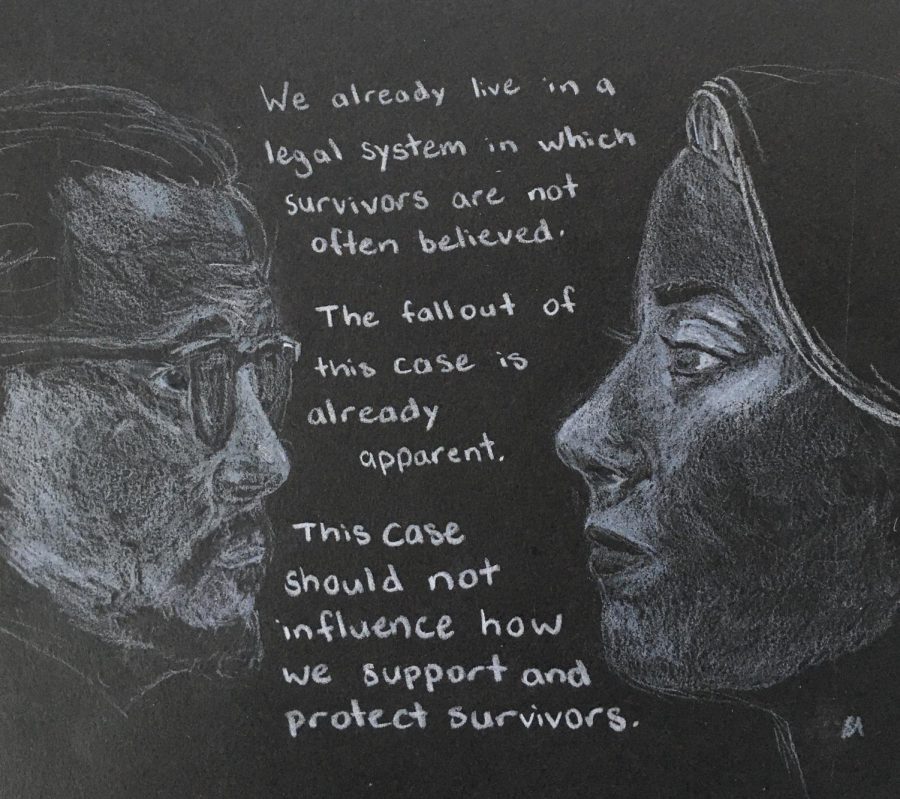The Johnny Depp v. Amber Heard Trial Hurts Survivors
June 6, 2022
Over the last several weeks, the Johnny Depp and Amber Heard trial has headlined our news feeds and has dominated popular culture. Depp and Heard have been battling a constant and contentious legal battle, wielding recordings, pictures, videos, and emotionally jarring testimonies from close contacts, now all being released to the media. Depp filed a $50 million defamation lawsuit against Amber Heard as the result of a 2018 op-ed published by Heard. In this Washington Post article, Heard alleges that Depp domestically and psychologically abused her. In response, Depp states that none of the allegations are true. In fact, he counters that Heard was the abuser in their marriage. Depp and Heard’s ongoing trial has raised questions about mutual abuse as well as falsehoods, through witness and photographic testimony, written by Heard in the Washington Post. In the trial, Depp’s lawyers have explained in great detail the many ways in which Heard’s op-ed caused irreparable damage to Depp’s career, reputation, and mental health. Still, Heard’s lawyers have countered with gossip articles and Depp’s substance abuse, all to find holes in Depp’s allegations and support Heard’s side of the story.
Regardless of the veracity of Depp’s or Heard’s cases, what remains under-addressed is the dangerous implications this case could have on survivors of sexual assault, domestic abuse, and intimate partner violence (IPV). Heard’s case should not be made into a monolith, or used as an argument to stop believing victims altogether. Grace Van Bever ’22 told the Register Forum, “If none of this is true, Amber Heard is endangering actual survivors of domestic abuse; half of the response from men online is ‘this is why we should never believe women.’ It’s dangerous.” Van Bever’s remarks are echoed all across social media, where many are voicing strong support for Johnny Depp, and using the inconsistencies, and possible lies, in Heard’s story to argue why we should not take survivors at their word, particularly female survivors. For instance, one user tweeted that “These MeToo Takedowns have too much in common to be random … a woman can bareface lie and get away with ruining a man and his career. … This is what the #MeToo movement created. Sickening.”
Again, regardless of whether Amber Heard’s story is true, only approximately 2-6% of reports of rape, sexual assault, and IPV are false. We already live in a legal system in which survivors are not often believed without proof, not to mention that the invasive, humiliating, and dehumanizing process of obtaining evidence to build a case can be traumatizing in itself. Many who experience IPV are simultaneously in psychologically and emotionally abusive relationships, made to think that they will not be believed or loved, rather that they deserve what has happened to them.
We are unsure of the verdict, but the fallout of this case is already apparent. There has been irreparable damage to society’s view on survivors of IPV and sexual assault. If Depp wins, there will be a positive light shed on the struggles of male abuse survivors, but this will also empower a sector of the population who use this verdict to delegitimize all assault survivors who speak up. If Heard wins, another sector of the population could perceive this as a classic, bickering, back-and-forth conflict that typically favors the woman. This potential result could discourage male abuse survivors to speak up about their experiences. Ultimately, this case should not influence how we support and protect survivors of IPV. Instead, we should rally to include people of all genders into these conversations in order to let survivors understand that they will always be safe and supported, regardless of gender identity.
This piece also appears in our May 2022 print edition.










